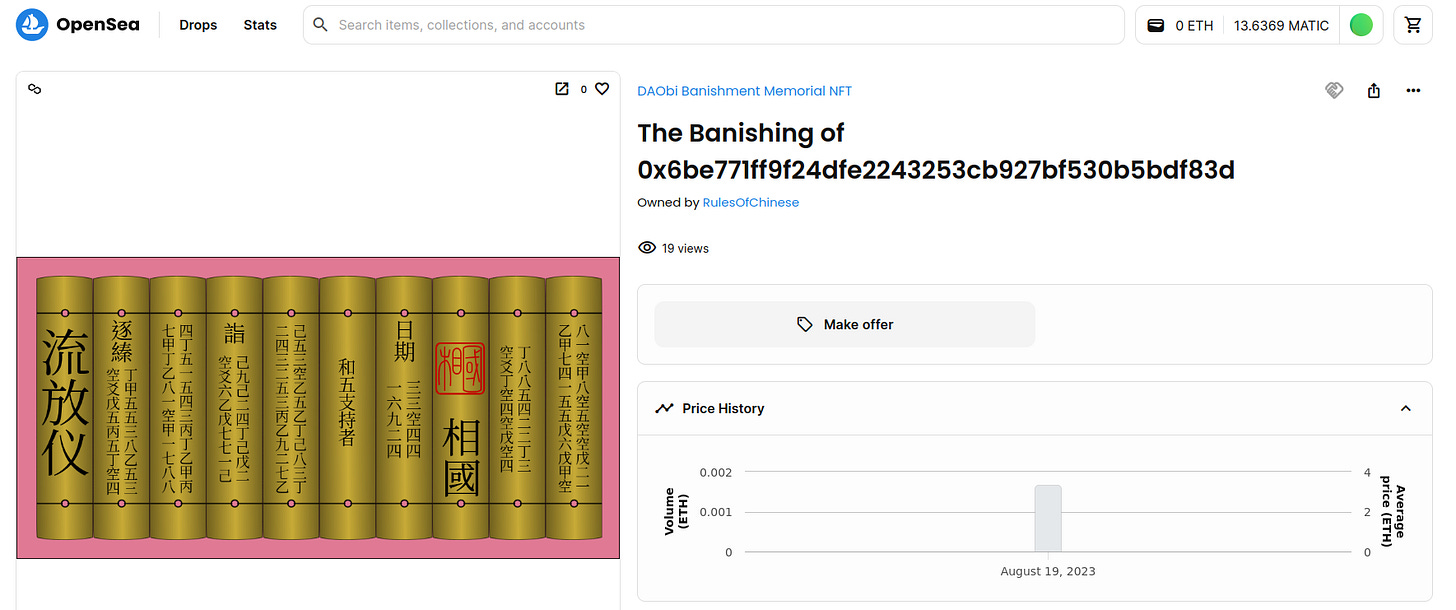The Politics of 0xbedience
If you don’t want to listen to me talk about blonkchain click out now.
In the previous essay I wrote about how the use of sanctions to maintain political loyalty is only really effective when a single entity has sufficient control over a large enough territory that simply getting up and leaving is difficult for most citizens.
Indeed, the difficulty of imposing sanctions is a frequently cited benefit of decentralisation: if you are a member of an on-chain organisation and do not like the decisions its members have been making, you can simply leave, keeping or selling your assets on the way out as you see fit.
If you are trying to build an on-chain politics sim (like DAObi, for example), this limit can be a serious obstacle to both cohesion and security.
DAObi centralises authority while decentralising power by giving the Chancellor (the player with the most supporters) quasi-absolute power over the system, but also allowing him to be voted out of office at any moment. The aim is to create a situation in which government is both stronger and more responsive for being subject to constant reelection than it would be were this pressure to occur only once every four or five years. However, the same Solidity contracts that enable us to do this also work to prevent the establishment of significant sanctions for misbehaviour, such as the creation of multiple voter accounts by one person. In a world in which anonymity is the norm, how can such dishonesty be prevented?
Our solution:
The recently-deployed DAObi Accountability Contracts permit players to stake a small number of DB tokens to accuse another of “excessive idleness”. To refute this accusation, all the target player has to do is click a button providing proof of life on the website. If he does so, he receives the staked tokens. If not, he is banished and the accusers receive a unique NFT as proof of their triumph, which can be kept as a trophy or carried back to their faction leader and exchanged for a financial reward[1].
This will hopefully be the first step in a move to an entirely staking-based system. Under this system, players will stake a small amount of DB to register their support for a given faction on-chain. If they leave of their own accord, they will get this back. If they are banished, they will lose it.
The goal of this solution was not simply to find a way to get rid of inactive players, disincentivise the creation of multiple accounts and to encourage political activity, but also to give the Chancellor a major - but not exclusive - say in the way the sanctions are implemented while obliging him to be intelligent in so doing.
The nature of the game is such that the Chancellor tends to have significant human and financial resources at his disposal. However he is also subject to the greatest pressure from rivals. If he is to maintain his position he must offer the highest reward of any faction leader for the banishment NFTs submitted to him, but he will also receive far more of these banishment NFTs than any of his rivals, thus his generosity becomes a constant drain on his resources.
Over time I predict that the system will evolve in multiple ways as a result of these changes:
The Chancellor and other faction leaders will eventually become the employers of separate freelance police forces dedicated to keeping their rivals honest by eliminating factitious voters from their supporter lists.
Supporters of certain opposition factions will either refrain from showing their allegiance or will claim loyalty to the Chancellor until they can be sure they have enough support to stage a coup, at which point a sudden raid will occur.
Others will use their latent weight to attempt to secure favourable policies, without necessarily going so far as to stake out a position on-chain. This has, to a degree, happened previously, when known-but-silent factions used the mere awareness of their existence to influence decisions regarding censorship.
If the DB value rises high enough dedicated head-hunter groups will emerge, tracking and eliminating enemy partisans on a mercenary basis.
Obviously the sums involved are - as yet - not large enough to be painful. However, the aim of DAObi is to serve as a governance sandbox. Just as the Chancellor selection mechanism was designed to demonstrate that it is possible to centralise authority without sacrificing accountability, the banishment mechanism aims to show one way in which it is possible to allow members of a decentralised system to police one another without this becoming a free-for-all. Vigilantes are given free rein to act, but must do so in the knowledge that they will lose money for every poor decision they made. Having built a centralised authority through decentralised preference aggregation, the aim now is to decentralise law enforcement while maintaining order.
[1] All credit goes to Skullhunter for designing and coding the mechanics of the banishment contract.





Does this concept have anything to do with $Libra memecoin? If so what is the game plan? I would love to talk about it.